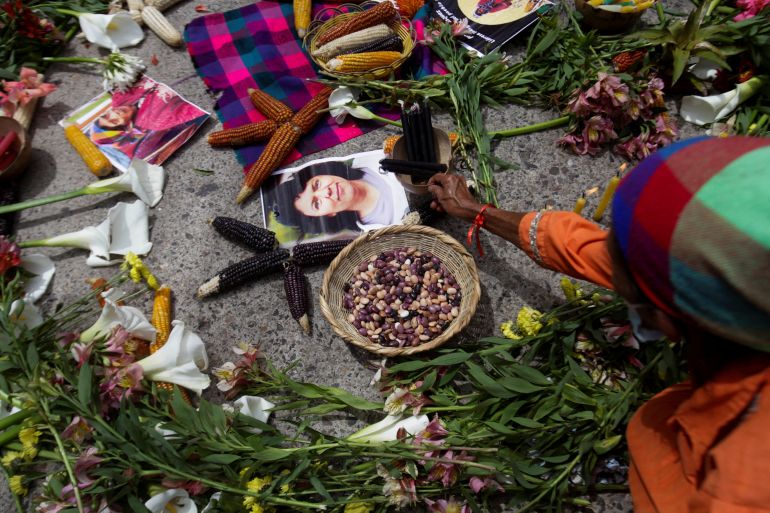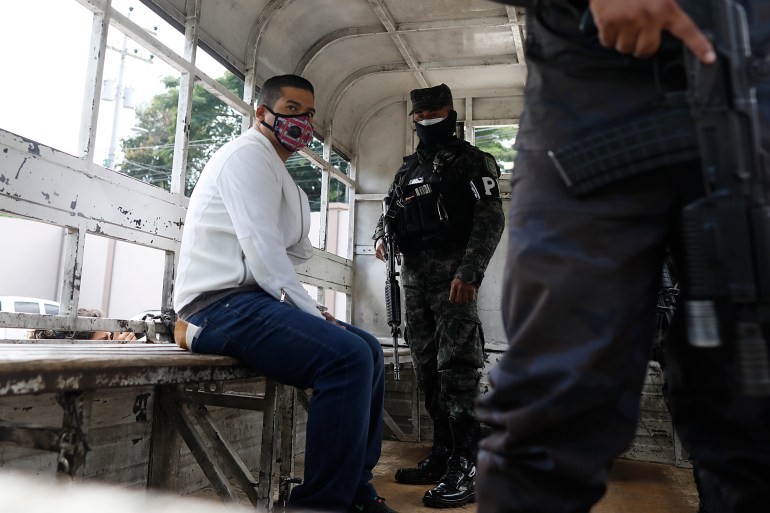Berta Caceres: Honduras executive jailed for 22 years over murder
Prominent environmental and Indigenous activist Berta Caceres was shot dead in her home in 2016.

David Castillo, a former top business executive found guilty for his role in the assassination of Honduran Indigenous leader Berta Caceres, has been sentenced to 22 and a half years in prison by a Honduran court.
Castillo, a US-trained former Honduran army intelligence officer and business executive, was the president of Desarrollos Energeticos Sociedad Anonima (DESA), which was building the Agua Zarca hydroelectric dam in Indigenous Lenca territory in northwestern Honduras.
Keep reading
list of 4 itemsHonduras ex-President Hernandez pleads not guilty in US court
‘An extradition foretold’: Honduras reacts to ex-president’s fate
‘It was a celebration’: Top court frees Honduras water defenders
Caceres, as the head of the Council of Organized Indigenous Peoples of Honduras (COPINH), had been the most visible and vocal member of the resistance to the dam’s construction.
But after years of threats, she was assassinated by a hit squad in her home in the town of La Esperanza on March 2, 2016.
Castillo was accused by Honduran prosecutors of being one of the top links in a complex chain of command that organised and directed the hit squad, which included former and active-duty members of the Honduran military as well as sicarios, or hired assassins.
A Honduran court found Castillo guilty of being a co-collaborator in her murder on July 5 last year. In December 2019, seven people, including another DESA executive, were jailed for between 30 and 50 years for their roles in Caceres’s murder.
Castillo’s sentencing is the culmination of a six-year push for justice in what was one of the most high-profile assassinations to have rocked the Central American country. But many Hondurans allege that complicity in the killing goes higher and that the full extent of the network which killed Caceres remains at large.
“The sentence reaffirms the importance of the need to look for the intellectual authors of the killing,” ‘Bertita’ Zuniga Caceres, the murdered environmentalist’s daughter and current head of COPINH, told Al Jazeera. “But 22 years is nothing compared to the loss of a grand companera, my mother.”

Honduras is one of the most dangerous countries in the world for land and water defenders, with more than 120 activists killed since 2010, according to human rights group Global Witness. Many of them were killed defending their lands or rivers from mining, agro-business, or dam projects.
What made Caceres different was her international standing: she gave speaking tours on Indigenous rights and environmental struggle throughout the Americas and won the Goldman Prize, or “Green Nobel,” for her work leading the resistance to the Agua Zarca dam project.
As an activist and leader of COPINH, which she cofounded in 1993, she had been one of the most high-profile leaders to help bring together Honduras’s disparate social movements in the wake of the 2009 coup.
Her killing was seen by many as an indication of an environment in which a militarised government, which allegedly favoured corrupt business interests and has been accused of complicity with organised crime, facilitated the murder of Indigenous and environmental defenders.
Castillo had been trained at West Point, the US military academy, and served in the Honduran military in the mid-2000s.
He later became a government worker for Honduras’s National Electric Energy company, where he was later accused (PDF) of illegally giving overpriced contracts and illicit permits to companies he would later run as a part of the dam project. A case currently underway in Honduras, known as Fraud on the Gualcarque, is determining whether the claims are true.
The Agua Zarca project was to be built on the Galcarque River, which holds spiritual importance for the Lenca people and is a critical source of water. The undertaking was marred with controversy from the beginning.
Anti-dam protester Tomas Garcia was killed in 2013, while state security forces and private security operatives committed widespread violence against Indigenous people resisting the project. Violence ultimately led China’s Sinohydro, the world’s largest dam builder, as well as the Guatemalan company COPRECA to pull out of the project.
Although Monday’s sentencing was celebrated, many Hondurans believe complicity in the killing goes higher.
COPINH set up camp in front of the Supreme Court early on Monday around the sentencing, where they erected an Indigenous altar, and then marched to the Central American Bank for Economic Integration, which financed the DESA project.
“We always knew that this case would drag out for a really long time,” said Karen Spring, a Canadian human rights worker who has lived in Honduras for more than a decade and knew Caceres well.
“People should know that David Castillo was just an employee who followed orders and was part of a structure [that included] very wealthy parts of the Atala Zablah family. There’s so much more to do in this case that by no means stops with David Castillo’s sentencing.”
The Atala Zablah family was a key shareholder in the DESA project and is one of the most powerful families in Honduras, with numerous investments in finance, construction, and sports. The family has long denied any involvement in Casceres’s killing.